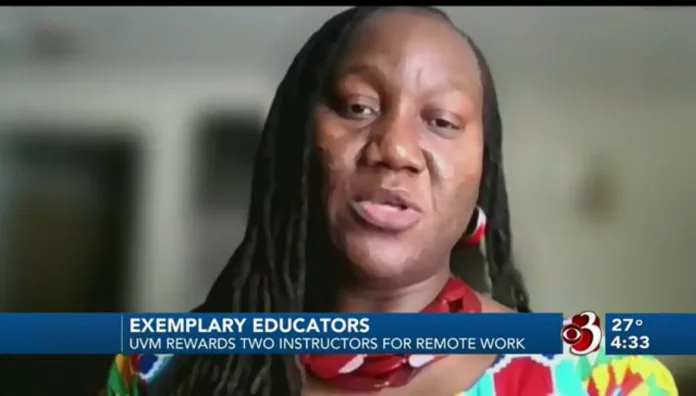
The University of Vermont is recognizing two educators who are changing remote learning for the better.
Created during the pandemic, the Prelock Online Teaching Award recognizes top-notch online educators.
When the pandemic hit, and online learning replaced time in the classroom, some people saw it as a disconnect. But not UVM educators Marie Vea and Sefakor Komabu-Pomeyie, recipients of the Prelock Online Teaching Award, which spotlights instructors for using remote learning for everything it is versus everything it’s not.
Vea, an assistant dean at UVM’s Rubenstein School of Environment and Natural Resources, teaches “Ways of knowing.” The class launched in 2020 calls into question traditional Western learning methods. “This class is really a creative forum to explore how we might gain knowledge across differences, across different experiences,” Vea said.
She says it took some creativity to get people to connect remotely, but eventually, she found success in acknowledging what learning at home is like. “Someone is in their kitchen and sharing that they’re making dinner or their children are around, or their pets,” Vea said. She says winning the award is an honor — but also says — remote connection plays an important role in learning — and could continue to move forward. “It really bridges across difference, and there could be ways that we could have conversations with communities that we might not have conversations with because they’re not in place with us.”
That’s an idea that Sefakor Komabu-Pomeyie capitalizes on her in class — “Global Disability Studies.”
“Anybody who hears disability, that person hears a negative story, right? I’m changing the narrative,” said Komabu-Pomeyie, a lecturer and educator from Ghana who developed the course from her experiences teaching American students. “Coming as (an) international student and then entering and teaching American students, and then knowing myself as a person with disabilities working with people with disabilities, in terms of research work, I realized that there is a huge gap.”
She intends to teach about disabilities in cultures all around the world. “You meet people from outside of the U.S. system, especially from Africa, Tanzania, Uganda, Kenya,” Komabu-Pomeyie said.
She also works to humanize the experience and to encourage advocacy and change from her students, no matter where they may be. The remote aspect of this course makes it accessible, adding perspectives from all over the world. “In building this course, I was very intentional to make sure that that child who, or that student who has no idea has no idea about how remote learning is, to have the equitable access to education,” Komabu-Pomeyie said.
She says she and her students are making changes in Vermont and beyond. “We don’t know how to ‘blow our own horns’ but I think I am learning that in America. That is a hard nut for me to crack, but a simple word to say I’m so proud of myself and the impacts, you know?” she said
The Prelock Online Teaching Award has two categories — synchronous teaching is when all students are in class together, and asynchronous is when students engage with the content and each other on their own time.
Though the real reward is increased accessibility to education for students, both educators receive a certificate and a letter outlining their accomplishments as well as a cash prize.
Source: WCAX

